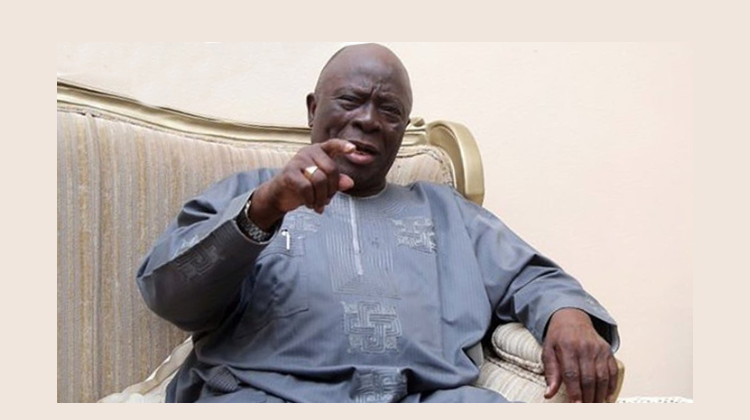Chief Ayo Adebanjo’s passing at the age of 97 elicited an outpouring of tributes from Nigeria’s political and social elite, all recognizing his indelible impact on the nation’s journey. A Night of Tributes and Service of Songs held in his honor became a platform for prominent figures, including current and former presidents, business leaders, and religious figures, to celebrate his life and legacy. The overarching theme resonating throughout the eulogies was Adebanjo’s unwavering commitment to justice, equity, and a better Nigeria, principles he tirelessly championed throughout his long and impactful life. His passing marked the departure of a true nationalist, a man whose life intersected with and significantly shaped Nigeria’s political landscape from the struggle for independence to the contemporary fight for democratic ideals.
President Bola Tinubu, in his tribute, highlighted Adebanjo’s significant role in shaping the nation’s foundation, describing him as one of the last remaining nationalists and independence heroes. He lauded Adebanjo’s principled stance during critical periods in Nigeria’s history, particularly his unwavering support for democracy during the annulment of the June 12, 1993, election. Tinubu’s personal connection with the late statesman was evident as he recalled Adebanjo’s support during his 1999 governorship bid, emphasizing the invaluable role Adebanjo played as a voice of reason and advocate for justice. The sentiment shared by Tinubu underscored the profound influence Adebanjo wielded across political divides, earning him respect even from those with whom he might have disagreed ideologically.
Former Presidents Obasanjo and Jonathan, despite past political differences, offered heartfelt tributes, acknowledging Adebanjo’s unwavering patriotism and commitment to national progress. Obasanjo, represented by Senator Ibikunle Amosun, recalled a recent visit with the late elder statesman, noting his frailty yet expressing surprise at his sudden passing. The former President underscored Adebanjo’s commitment to national restructuring, a cause both men, despite their political divergences, passionately supported. Jonathan, in his tribute, described Adebanjo as a national hero and a symbol of resilience, highlighting his courage and unwavering stance for the rights of ordinary Nigerians. These tributes showcased the unifying power of Adebanjo’s character and his impact on national discourse beyond partisan politics.
Former Vice President Atiku Abubakar echoed these sentiments, referring to Adebanjo as a fearless elder statesman and a true nationalist who dedicated his life to fighting colonialism, opposing military rule, and championing democracy and good governance. This multifaceted engagement with Nigeria’s political evolution positioned Adebanjo as a consistent voice of conscience, challenging power and advocating for the rights of the people throughout his life. The theme of Adebanjo’s lifelong dedication to a just and equitable Nigeria resonated throughout the tributes, solidifying his image as a principled leader whose actions were consistently guided by deeply held convictions.
Beyond the political sphere, figures like Akinwumi Adesina, President of the African Development Bank, and Peter Obi, the 2023 Labour Party presidential candidate, offered personal reflections that further revealed the depth of Adebanjo’s character. Adesina described him as an indomitable statesman and mentor, while Obi recalled Adebanjo’s insistence on the importance of policies that positively impact the common man. This emphasis on the well-being of ordinary Nigerians further solidified Adebanjo’s image as a man of the people, deeply concerned about the practical impact of governance on their lives. Obi’s anecdote about Adebanjo’s challenge regarding the timing of his manifesto release highlighted the elder statesman’s acute engagement with the political process and his desire for accountability and transparency.
Other notable figures, including Oby Ezekwesili, Arunma Oteh, and Aliko Dangote, offered tributes that highlighted Adebanjo’s revolutionary spirit, integrity, and unwavering belief in a united and just Nigeria. These perspectives from diverse sectors – education, finance, and industry – further underscored the breadth of Adebanjo’s influence and the widespread respect he commanded. Dangote’s emphasis on Adebanjo’s advocacy for true federalism revealed yet another facet of his political philosophy, one that resonated deeply within discussions about Nigeria’s structure and governance. The collective tributes painted a portrait of a man deeply committed to shaping a better Nigeria, his convictions guiding his actions across decades of political and social change.
Pastor Tunde Bakare’s sermon, “Lord, Make Me to Know Mine End, and the Measure of My Days,” offered a spiritual reflection on the transient nature of life, contrasting worldly achievements with the enduring importance of values and service. His message served as a poignant reminder of the legacy Adebanjo leaves behind, one built not on the pursuit of power or wealth, but on the bedrock of truth, justice, and unwavering commitment to the betterment of his nation. The gathering of dignitaries, including former governors and retired military personnel, served not only as a final farewell to a revered figure but also as a call to action, inspiring those present to emulate Adebanjo’s dedication to principled leadership and selfless service. The event transformed into a poignant reflection on the enduring power of a life lived with purpose and integrity, leaving an indelible mark on the nation’s history.


